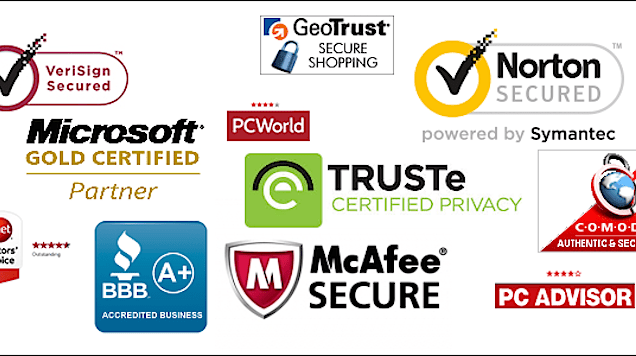Chances are you’ve come across “seals of approval” on web sites at some point in your web browsing life. Whether it’s a a Norton Secured Seal, or the TRUSTe Certified mark, they seem like a good thing to watch out for. How-To Geek points out how wrong that is.
Pretty much any seal you see on a site is just a JPG and doesn’t require any work to put it there:
These badges — technically called “trust seals” — are just images. Anyone could copy and paste these images and put them on any software download page. Really, we can’t stress this enough. Although a seal of approval might look fancy and official, it’s no different from a statement written out in text. If you saw a scammy-looking software download page that said, “This software was certified virus-free by Symantec!”, would you blindly trust it? Of course not! Of course they’d say that — anyone can write that.
If you want to actually verify the claim in a seal, you’ll have to head over to the seal’s web site and research the company in question. Otherwise, those claims mean absolutely nothing. If you’ve been using a computer for a long time you’ve probably already figured this out, but it’s a good tip to add to you tech support kit. Head over to How-To Geek for some more tips on reading through those seals of approval.
All Those “Seals of Approval” on Websites Don’t Really Mean Anything [How-To Geek]

Comments
3 responses to “Don’t Trust A Web Site’s Seal Of Approval”
And clicking on the potentially dodgy seal is a no-no as well. That’s another attack vector that could be exploited.
Of course the whole point of the seals was once upon a time that you were meant to load them off the validating company’s server, and by using referrers it would be able to verify that the site was legitimate. Normally the image was meant to include some identifying/date information to help verify it’s dynamically generated.
Its a dumb idea, and didn’t work but has stuck around on scammy sites like download.com.
Normally I like the Lifehacker Posts but I dont agree on this one. Seals of Approval and Reviews helped me a lot tto build trust and drive Conversions. I used the Trustbadge reviews widget on my online shop to collect and show customer reviews. It’s fairly easy to use. They have many integrations in different shop systems. And it comes with 7 languages and is mobile-optimized.